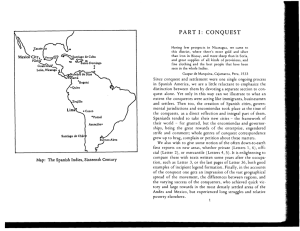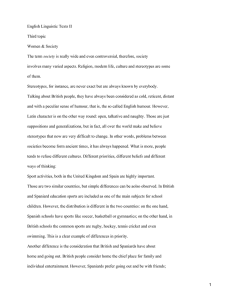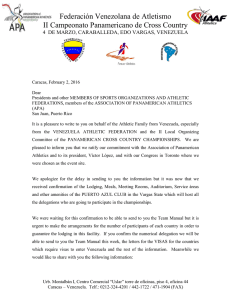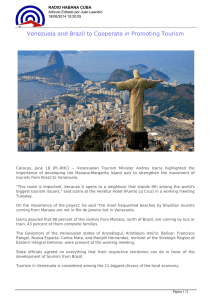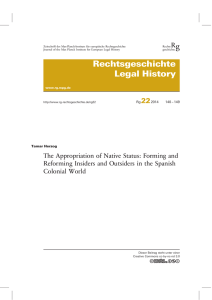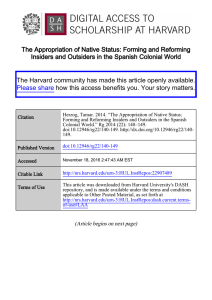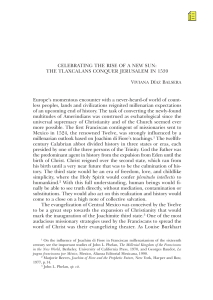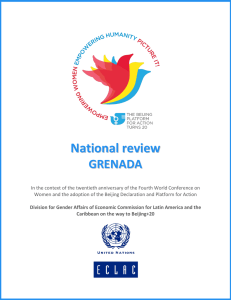108 IVJ-IEN America was first discovered, savages of
Anuncio
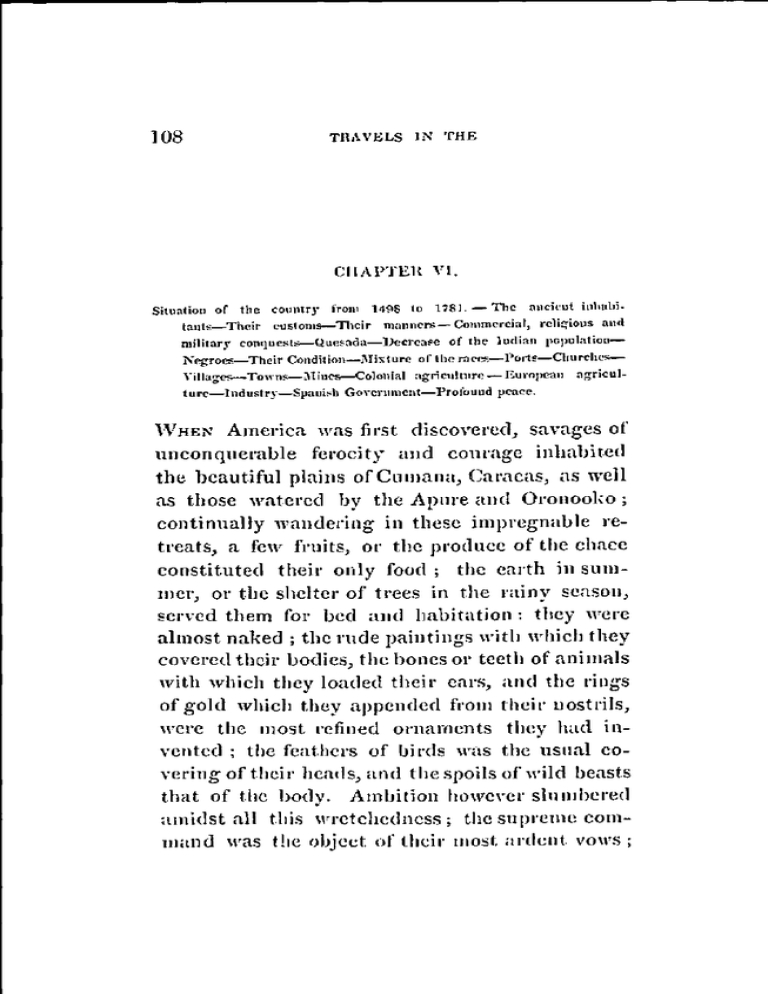
108 TRAVELS IN THE CIIAPTE1t VI. Situation of the country iron' 1495 to 1781. - The azicirut inimbi. Iauts—Their euslonit—l'licir nitti,iiert— Commercial, reliioos and military conqucsts—Quesada—Decrease of the Indian populationNegroes—Their Cortdiiio,,—Mixture of the ViiIages—Towns—Mines--Co]oI'ial egriculiure— European agriculture—Industry—Spanidi Govcr,tincnt—Profound peace. America was first discovered, savages of unconquerable ferocity and courage inhabited the beautiful plains ofCntnana, Caracas, as well as those watered by the Apure and Oronoolco continually wandering in these impregnable retreats, a few fruits, or the produce of the Chace constituted their only food ; the earth iii suminer, or the shelter of trees in the rainy season, served them for bed mid habitation they were almost naked ; the rude paintings with which they covered their bodies, the hones or teeth of animals with which they loaded their ears, and the rings of gold which the y appended from their nostrils, were the most refined ornaments they had iiivetited the feathers of birds was the usual covering of their heads, and the spoils of wild beasts that of the body. Ambition however slumbered amidst all this wretchedness ; the supreme coniiiiand was the object 4 their itiostanlent vows IVJ-IEN Itln'LJiILiC OF COLOMBIA. 109 it was the recompense of the most pai fit I trials; the least expression of complaint was punished by exclusion. What need the n had these ha N b;rriaiis of a chief? what di fibrences were to be dcci( 1w I ? what spoils, what conquests were to be shill-CI ?-The blood y corpses of their ettelnies; for the greater part of them, when the chase Failed, fed 11 1)0 11 the palpitating un ibs of their prisoners ; there were but few tribes who disliked these horrible repasts. In the ]no I ' ut iii ns, on the contrary, rary, the manHers were ameliorated. Time rich pIOVIIICC of An tioquin alone was still addicted to blood while iii the p! ai ii in which Santa-Fe' was afterwards built, the nation of the Moscas already possessed some laws. The coin mun ications between different villages were safe and frequent. Agticul hire commenced to he iii esteem, property was respected, the towns had habitations tolerably comnniodious and the people were dressed with decenc y . \S ithomit being surrounded by all that splendour to he found iii the courts of rio.. noelutitlami and Cnsco, that of the chief of Cmiiid itma inarca, to whom the Spaniards gave time title of king, was magnificent. Religion Possessed its temples, altars and priests. Of all the Indians who inhabited these vast regions, the Moscas were the onl y ones who restricted the offering to their Gods, the sun and moon, to birds which they had previously taught to pronounce some words of their language, in order that the 110 TRAVELS IN THE juan viecheated divinities in take them for human tinis. Every where else, n otlii ughut human victims were offered, and young pet-soils of both sexes brought up to be butchered in these horrid sacrifices, were sold at it most enornious price. Upon hearing of the discovery of the flew world, the most savage inhabitants of which wore collars and bracelets of gold, the Spanish soldiers, weary of European warfare, which now afforded then but it poor booty, and the Moors and Jew's, impatient of the voice, to which the y had recently been subjected, bid adieu to Europe, and set off to visit these new lands, and to find another country. But along the it-hole coast of South America, which is washed by the sell the Antilles, the y were repulsed by the Indians, and found all their flattering hopes disappointed. These misfortunes caused so general it despon- dency, that the Spanish government found itself obliged to offer the conquest of Venezuela to the highest bidder. It was undertaken by soiiiq german inerchants in 1528, who executed it with all the cruelty iinagivable.f They succeeded in gaining possession of the * The fact is that Charles V having borrowed considerable sorns from the Wdsers of Aushourg, at that time the richest merchants in Europe, offered them I lie province of Venezuela, in payment, and times' accepted it as a lie1 of Camille. See Ravnal, Ii istoire des I mules.— Tran.cIaeQ,'. f Depons, tome I, p. 77. Rlt'(JRI..IC OF COLO_\IRIA. Ill coast, and had already erected habitations at sonic distance in the interior ; these were however continually iv redLicec! to ashes by (INC Savages who had taken refuge in the woods, and the icrrifled colonists, scarcely dared to quit their pallsailed fortresses.— Religion now undertook to put a stop to these excesses, and to itiake a conquest which the sword had been unable to ctfeet. Missionaries penetrated into the wild retreats of the fugitive Indians. 'l'lic greater number tuber of these peaceful conquerors became the victims of their zeal. Those who had the good fortune to escape, obtained victory after victory; and as they advanced, founded churches of thatch and rushes; at length, thies' arrived on the borders of the Oronoeko, after having opened a safe communication between that river and Venezuela, by means of the as y lums, inviolable even for the savages, which the y had erected at intervals. In the mean time, the soldiers jealous of the gtory of Pizarro and Cortes, scaled the Cordillera milder the command of Qu esada, and subdued empires. In fact this chief, stimulated by the seductive accounts of a great number of Indans who, poi ii ting to the son Ui, had ass tired him that he would And in that direction it rich and powerful empire, set ON from St. Martha in the month of April 1536, at the head of six hundred and twenty infantry, and eighty-five cavalr y . It was 112 TRAVELS IN THE with infinite difficulty that Ins slight and ill constructed boats could ascend the Magdalena, but the obstacles opposed to him by this' rivetS, instead of arresting his progress, only inflamed his courage. A great number of his brave cornpions perished either with fatigue or want. Not lung, however, could clan ut him : he attacked the Indians inhabiting the canton, where Velez has since been built, gained an easy Conquest, traversed their territory, and victoriously descended into the beautiful plains of Plate and Bogota. His valour had not been abused by idle tales. The province of Cu ndinarinarca, since called Santa-Fe, was very rich. Powerfol princes, called zi pas, at the head of a feudal government, ruled the country, and protected all which had already begun to develope itself; their temples, and palaces of straw, contained no inconsiderable treasure. Thus a few hold and enterprising men, in the course of one year, effected the conquest of those countries to which the name of the Viceroyalty of New Grenada has since been given, but which form only one portion of it. The proofs of a movement towards civilisation was every where observable among the Indians. The avarice of the Spaniards, increased by this circumstance; sought only after new conquests. Neither t tic • The Indians were not wanting in courage, but t ile Spaniards were in the sixteenth century vt,ot the Fiezich, wire in iii' nineteeutl Ii, fi,rt,,nate and niviicihlr. ItEPUILLEC OF COLOMBIA. 113 bud ness of the roads, the vant of provisions, the oppressive intensity of the heat, nor the poiso ned ariow.s of t lie natives, could damp their enterprising con rage. Some adventurers, collecting a few soldiers in the ports of the sea of the Antilles, and furnished with ammunition, proceeded to con q uer kingdoms. Not less brave than Pizarro, Bcnalcaztr, at first his lieutenant, became his rival in glory. Quito, Pasto, l'opayan, acid the valley of Canca, acknowledged his authorit y. Then, passing time Qu I nil u and the Magdalena, and arriving in the plain of Bogota, at time moment when Quesada had completed its conquest, lie became one of the founders of the capital of these rich possessions. Upon hearing the recital of so manyy fit iii Otis exploits, at the sight of the fields of battle, and the impregnable places where the Spaniards fought, it is difficult to explain how they ohtamed sucht rapid and astonishing success, especially if credit be given to the accounts of the first historians, of the considerable number of in habitants who were found there. But, already mistress of the coasts of Africa, Spain only abandoned them for those of America, because the population of the latter were found to be less numerous and warlike. Besides, being assisted by the intestine quarrels among the Indians, the Spanish captains every where foundd ttLltimrs to J-- 114 TRAVELS IN THE he gained over these acted as guides, and (115covered the ambushes laid for them, while wol lien served them as interpreters and spies. Recruiting was particularl y carried on at St. Domingo this island was already filled with negroes and mulattoes ; they were formed into regiments, and sent over to the continent. These men were the best soldiers that could be CIIIployed in this burning climate. It is doLl lless by inheritance that the Indians still indulge an implacable hatred against men of colour. These, after having contributed to the conquest of such rich empires, were now to assist in peopling them ; for the conquerors having imprudently employed in the mines, and in the labours of the field, the Indians, for a long time accustomed to idleness, and incapable of working in the burning lands of the tropics, where their fathers were not born, had sunk under the weight of fatigues, which were indeed light, but to which they were not accustomed. Let the white and feeble population of our Antilles be forced by their masters to dig the earth for a few days, exposed to the burning heat of the Sill), although that under which they were born, and the race will gradually sink, and at last entirely disappear. This was what happened in the Atticrican archipelago; at the end of two centuries none of the natives were to be found. Those of the plains of Venezuela, would likewise have ItEI'UIILtC OF COLOMBIA. 115 disappeared had they not taken refuge in the forests of Oroiiooko. Such t'as not tire ease in the nlonntail)s the pail) liii In ho urs of a g riculture were not fatal to any of the Indians, because they were ii urler a climate suited to their strength; thus, the IllitIul)eI of Indians, far from diminishing, shiLl g, was considerably itereased. The African then eon id alone resist the tropical heat ; he alone, could he breed against his inclination to I a hon r without pens Iii rig froi n grief and fatigue. Permission was therefore asked of the Spanish gove rnmemi t to allow the importation of them. Time court of Madrid hesitated a long time before it would grant this dangerous privilege ; it was at length forced frotmi it, Ill order to appease the cr y of humanity which rose on behalf of the Indians, and to people those vast empires which, even before the conquest, presewed so many deserts and solitudes. Thus the negroes destined to cultivate time American soil, first entered as slaves into those countries, which they were one da y to share wit Ii their masters. 'l'hic latter not. having been aecoinpained b y women hi their perilous expeditions, at first the y took those of the vanquished nations, and soon afterwards, those of their slaves. These last in their turn, fastened in the enCOULUI1(/ÜS to tile same chain as the Indians, overco LIII ag their antipathy to these coil] jilL!) to ItS '2 116 TRAVELS IN TUE in misfortune, asked, and obtained leave to intermarry with them. It is thus that the entire population of Venezuela, the whole of whose features announce an Asiatic origin, assumed a thousand different hues ; the white colout', however, was considered as exclusively entitled to respect, and the women coveted the honour of leaving to their offspring this proud inheritance ; so that, in a short time, the nu ni her of these half whites, or children of Indians and Europeans, was prodigiously increased. A great portion of the Indian fatuity soon became so ainalgammated and confounded with them, as to induce the belief that they had been all mas sacred by the Spaniards. At the same time, this fatni1vaireadv much mixed, was further augmented by a multitude of negresses ; but, notwithstanding these numerous crossings of the different races, the honour of peopling the continent still belonged to the white race, and the number of men of colour was far less than in the Antilles, where the white colour had a constant tendenc y to lose itself in that of the blacks. Having become masters of the coasts, the Spaniards lost no time in building several forts, where, defended from sudden surprise and always ready to embark oil first serious attack, they prepared for the conquest of the interior provinces. Their positions were well REI'L) BI..IG O F L'OL,UM lilA. 117 chosen, tlie'ç availed tlieinsel yes of the suggestions of nature, nrc, which, iii different parts, oflèred t lie iii places proper for resisting oil hand, external enemies, already jealous of their conquest, and Oil the Other, those ose who in the interior, were meditating but too late to wrest them from them Puerto Cabello, la G nayra, defended Venezuela i\Iaiacaybo the entrance of the Cordillera, Santa Martha and Carthagena, the rich canal of the Magdalena ; San 'Fho was, the Oronooko ; I 1anama, the important passage of the two seas. Their flag was hoisted oil several points of the coasts Of the Son t Ii Sea ; and Spain, in these latitudes tlieii unk flown to the nations of Europe, was not under the necessit y of making its sovereignty otherwise respected. Upon advancing into the interior of the con ntrv, tlics' never neglected building it temple. the y had taught the Indians to respect these asvl a ins, b y granting them their lives, when, after a defeat, they fled to them these churches also served to induce the savages to quit their forests, by the attraction of the eeiemonies ill vhi I eli the Spaniards always display itiuchi inagiii ficence. But if the y desired to establish themselves in places inhabited by these ferocious nations, the house of the curate was always fortified, while a di teli dug around the mie losti re of the village, defended it against a surprise ; notwithstanding 118 TRAVELS IN 'VH}1 these pitcuttons, numbers of them were ticstroycd by the Panches and the Andaquis. Better informed of the enterprises and designs of the Spaniards, these two tribes waged a long and cruel war with them as late as the commencewent of the last century. Although the establishments of New Grenada became every (lay more important, the people were still poor ; chu relies alone were ornamented, the dwellings were nothing but huts of mud and straw. To possess a cock and a hen, was to be rich ; a cow, a bull, and a horse, were a fortune. It was not till the seventeenth century, that some fowls were seen at Bogota, and the name of him who first introduced them, has been preserved with almost religions veneration. Provisions were then scarce and clear ; the usual food was the fruits of the earth, which were exceedingly multiplied, for no one ever travelled without carrying seeds with him. Glory consisted in gathering a new fruit, and luxury in presenting it to one's friend. After the lapse of a century, the face of the continent was changed forests were cut (lown to make rootit for orchards. Cattle were multiplied in the rich pastures which bordered the banks of the rivers, horses and mules became more common and man, who without their assistance, laboured with difficulty, could, when poSssiIlg them, undertake larger Operations, iflI'IjI1LIc OF COLOM BIA. 119 open roads, and increase the miniber of villages, for lie was then en enabled to transport at a small CXCHCC the produce of his fields. The villages were now enlarged, and the wretched fortifications, which formerly enclosed timeiii, fell into ruins. Before the eighteenth century, towns began to be raised, at the head of which the capital Santa-Fe soon equalled those of Europe of the third class. This increase of the population occasioned a new division of South America. In 1718, 'New Grenada, (lependeui t upon Peru, was erected into a vicerovalty and in 1731, the provinces of % Teilczuela were placed tinder a particular government. Thus, in the space of a century, from a few scattered tribes of cannibals, and African slaves, a new Spanish people had arisen, having the same worship, government, laws, customs, and Iangnagc ; Spain had not Thu nded colonies, but 118(1 created nations and empires. Before being agricnittirits, the first American colonists were inerchatits ; this so enriched the maritime towns, that they soon acquired greater importance and extent than those of the interior. Cartliagena an d Pa il a i naespecially became rich and populous. Afterwards, without disparagement to their interests, the y fottnd rivals in the inland towns, Which, Lt len g th, eclipsed (lie iii Nvilell the people been LI toigri cult u rists Caracas, Santa-Fe', andd 120 TRAVELS IN THE unhealthy coasts of Quito, had no equals oil the sea. Before undertaking any agricultural schemes of importance, capital was necessary. At the time of the conquest, the Spanish soldiers soon dissipated what they had gained b y pillage. The .Jews and Moors, who had embraced Christianity, in order to be allowed to enter America, had bought up these spoils at a low rate and, being for the most part established at Popayan and Antioquia, they commenced working the mines so abundant in these provinces,.and which had already been turned to some account by the Indians. Africans, transported at a vast expense into these distant countries, dug trenches in every direction, and following the system, which they had seen adoptcd in their own countr y , confined themselves to washing the earth. The metal at length appeared in large quantities, and Spain then found that, if the conquest of Mexico had put her in possession of the richest silver mines in the world, that of New Grenada, had given her a territory abounding in gold. She had established a mint at Mexico, another at Popayan, and a third at Santa-Fe ; notwithstanding the clumsy method of the negroes, more than two millions of gold piastres were annually produced from the smelting houses of New Grenada. Previously to the introduction of these establish- REPUBLIC OF (:01,031111A. ZIlCH tS, 191 niaclujuina was the only i none>' struck this was a shapeless coin, without border or clligv of the prince ; individuals also could obtain the right of coi iii ng money, Upon pa yment of a small douccu i' *. As ma y he supposed, Spain did not receive the whole of this precious metal on the contrary, site was obliged to p xay it eon.sidcrab!e part of the local expenses with money (lflLSVfl flout Mexico. rliiie towns, however, were increased and beautified, and agriculture began to be in repute. It was divided into colonial agriculture and European agriculture the former, in more able liaiicls, would IULVC tiiitde immense progress sugar, coffee, and cocoa, grew with wonderful fecundity ; the indigo and time cotton-tree were indigenous and wild plaits. But all these were ne-lected Caracas alone undertook to attend to them, and its exportations consequently doubled those of the viceroyalty. The provinces which formed New Grenada being composed, for the most part, of cold regions, had lavished their mone y , and the sweat of their brow in cultivatinour grains and fruits ; but with such little weI hod, that they scarcely could produce sufficientt for their own consumption. Fruits, abandoned to the came of nature, resembled those of Europe ill appearance rather than in taste. Jove. jlIcI,ztIria u/ i j in, ,S'umanon. 122 TRAVELS IN THE The industry of all these countries was hut very homely -I manufactures of cottons for the clothing of the people, were to be found, and nothing more. Spain, upon this subject, was inexorable, notwitltstan ding herown manufactures were very limited ; and although she was thus obliged to purchase at foreign markets the articles necessary for her American colonies. Her only object, however, in these prohibitions, was a system le which should insure her an empire of rule three centuries. In fact, regarding their colonies as integral provinces of their empire, the kings of Spain had forbidden the culture of the vine at Quito, but had permitted it at Lima. Olivetrees were to be seen at Chili, while they were not allowed to be planted at Buenos Ayres. New Grenada was obliged to close up its silver mines, at the requisition of Mexico; who, rich in its metallic operations, did not possess the right of undertaking agricultural or other enterprises, which would have interrupted its relations with the mother country. The small number of the inhabitants, their ignorance, the mildness of their character, their docility, the authority of the clergy, rendered it easy to establish any form of government ; but the distances, the dii'ficnity of communication, were obstacles to its consolidation not easily to be surmounted each revolt might produce a schisin. The Incasines adopted were very s;igauiolis, and cli splayed IlIi'URL.iC OF COLOMBIA. 123 nut foresight in the advisers of Charles V. The habits of both people were monarchical, onarcliical, hut the licence of warfare, and the i ndepeLldan cc of the Savage life, had imparted 1)0th to the conquerors and the conquered an impatience of controiil difficult to be overcome. Both parties acknowledged the superiority of the mother city , and felt sensible that they stood in need of its support the former, for the peaceable enjoyment of their conquests the latter, for the amelioration of their condition—all ii'erc anxious for a mixed government. In consequence, the superiority was preserved to the victor by the vice-royalty, and protection to the latter by the municipal code,—to all, a defence against European oppression by the establishment of audiences. The country was divided into a vice-royalty and captaincy-general, subdivided into lieutenancies, provinces, mnagistracics, commanderships and missions. The government founded ill America experienced the lot of all human institutions : it was clisfigi red b y abuses, the municipal governmnt degenerated into a tyrannical oligarchy, because intelligence was rarel y to be met with. The nietimbe rs of the audiences, whose dut y it was to defend the oppressed, became themselves the oppressors. The viee-ro ys were deceived, or fected to he so, and were careless of their duties from all Cage iii 055 to advance their fi rtuiie U 1(1, it 124 TRAVELS IN THR lastl y, the Council of Castille, established in 1511, from the want of correct information, often pronounced erroneous decrees. But notwithstanding all these defects, tire Spanish colossus was firm and unshaken ; its coasts were ravaged, its seaport towns burnt, r was and its fortresses besieged but its territoy still untact. If Anson returned victorious from the South Sea, another English admiral, Vernon, being repulsed at Carthagena, retreated with his army in disgraceful flight, and found refuge in his fleet. Spain carefully guarded her widely extended coasts; and, notwithstanding her iiiisfortunes and her decadence, she left to America the greater part of the treasures drawn from her bosom, in order that these countries might enjoy a tranquillity unknown to tile inot tier country, upon which England made war every twenty years, in order to deprive her of the little riches she received from her colonies. It is an historical fact, unique of its kind, that, under the protection of a people few in number, without industr y, without commerce, badly armed and defended by an ill-organized marine, a whole world enjoyed, without interruption, a peace of three centuries. At the end of a century, the toads were all safe, the cannibal tribes had fled fir from civilization, or had received its benefits ; morals, though not pure, were decent ; religion, every where respected by IIEI'IJLIL(C OF COLOMBIA. 125 the people, drew still closer together the tics of Society by the sacrarilents WhiCh render theill in. dissoluble. A few soldiers in the capital, forwed the bod y -guard of the viceroy, but not a satellite was to be found in the other towns of time interior; the onl y use of anus was against the wild beasts. The different provinces had a free intercourse, which was kept III) between time different provinces ; that between New Grenada and Caracas Was alone forbidden. The Spanish government, already foreseeing the (hangerotis ambition of time inhabitants of the plains, was anxious to prevent, its crisis. The taxes were moderate, the navigation of the rivers, fishing, hunting, the clearing and draining of the lands, were all as vet unincu inhered by an y law. No right, but that of individuals, was as yet known ; provided their property was respected, the cutting clown of trees, the changing the course of rivers, the destruction of animals ; in fact, an indulgence of every possible caprice was allowed, without paying any tax to government, or soliciting a special permission from rich and overgrown proprietors.
